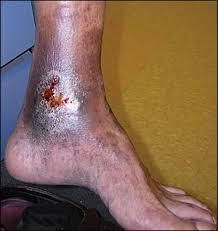One of the most common contributors to the development of leg wounds is venous disease. This can occur either because of venous insufficiency—leaky valves in the leg veins or because of issues stemming from a DVT (deep venous thrombosis). Both of these problems contribute by causing high pressure at the ankles that impair the healing of the wounds. Silicon Valley’s South Bay Vascular Center and Vein Institute doctors are recognized as the leading wound care physicians in the greater San Francisco Bay Area and Dr. Kokinos is the medical director at both the Verity/O’Connor Wound Care Center in San Jose and St Louise Hospital Wound Care Center in Morgan Hill, CA.
Venous wounds have a classic appearance. The wound is generally around the inner or outer ankle bone and the skin around the wound is often very dark (hyperpigmented). The skin can also be quite leathery. Not everyone with a venous wound has varicose (bulgy) veins, but many do. These can often be painful, and even with excellent care, can take many months to heal. Although the diagnosis can be made by simple examination, it is important to do an ultrasound to get a roadmap of the venous system so that any problems that can be fixed are addressed.

The specialists who deal with the venous system best are called vascular surgeons. These doctors can deal with both leaky valves as well as blockages in the system. It is felt to be very important not only in helping these wounds heal, but in preventing them from coming back, to treat the underlying venous issues. For the leaky valves, this is done by sealing the veins closed, often using the VNUS closure catheter or a laser fiber. For blocked veins, they can often be treated with stents that will hold them open. These procedures are all minimally invasive and can be done in the office setting. With all venous ulcers, compression using medical grade stockings is vitally important. In addition, there is evidence that using an old drug called Trental or a newer one called Vasculera can help heal these wounds faster.